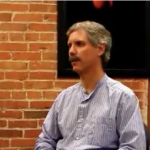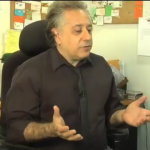As the production stage manager for Spamalot, at the Wynn Hotel in Las Vegas, Tom Bartlett has his hand in just about everything. In third grade, when the class was producing a play, Tom wanted to pull the curtain and run the lights; many years later, he is essentially doing the same things. “I get to be the center of the hourglass,” says Tom. “Just about everything filters through the stage manager.” Passion, in Tom’s eyes, “is what you cannot wait to do in the morning.” “If I wasn’t making a living as a stage manager,” Tom adds, “I’d be doing it for free.”
After following his passion through high school, Tom found that college was not for him, and left after a year. Through friends, he found his way to become a touring stagehand, and the rest is history. “If you put your passion out to the universe,” says Tom, who has made it to the very top of his field, “there is really no reason for the universe not to support you. But you have to put yourself out there.”
Although he is somewhat stable in Las Vegas, Tom admits that in the theater business, “traveling is the price you pay.” If he were able to give himself advice at 23, it would be about listening. He says: “Listening is a skill and requires practice. I would practice being intently involved in what people say. Stop formulating the next thing you want to say, and sit back and listen.”
Interview: How I Became Stage Production Manager
Well, you can do the introduction of yourself to the camera.
Oh, okay. My name is Tom Bartlett. I’m the production stage manager for the Las Vegas company of Spam-a-lot.
That was easy. Okay. What would you, how would you define the word passion?
Passion. Passion is something that when you wake up in the morning, you can’t wait to do something. If I’m passionate about my job, which is what this is about.
It would be about the energy of doing something. The love of something. To get up in the morning and want to get out of bed to go do something. Or to look forward to doing it.
Cool. I’m okay with that. I don’t think anyone has said that. You’d be amazed how many people who don’t know each other will answer that question by saying the exact same thing. Fire, desire, fire.
How did you get into stagecraft? How did you get your way into the theater? When most people think of someone working in theater, they think you’re an actor.
I was in third grade and we put on a little play. I wanted to pull the curtains and run the lights. And that’s what I do. I just have always done it.
I performed in high school, but I always, always built the scenery, did the lighting. Sound, props…we had fun doing it. We never considered it work.
And now, they’re paying me something I’d probably do anyway. I mean, if I wasn’t making a living as a stage manager, I’d be doing it in community theater or children’s theater. Or church concerts.
So it’s sort of something you have to do no matter what.
Yeah.
Not just because you’re doing it at a high level.
Yeah. Exactly.
Now what about stage managing, sitting on the design side of things where you work on a show until it opens and then you walk away. Where an actor is in it every single night. The stage manager is kind of a bridge between those two things. Is that something that you’re specifically involved with because you really like being in the middle of those things.
Exactly. As a stage manager, I get to be the center of the hourglass. Whenever anything comes through the hour glass, whether it’s stage issues, actor issues, costume issues, lighting issues, rehearsals, everything filters through the stage manager.
What I get to do is make sure everyone knows what’s going on. The best part about the job for me is maintaining the director’s intent. Once the director goes, I’m the guy that gets to maintain the show. I get to rehearse the understudies. I get to direct the understudies. And it’s great. It’s like I get to play theater.
And you don’t have to walk away from your baby.
Oh no. I get to stay here. I get to watch people grow. I get to watch an understudy go in and grow.
I worked with a girl in Phantom of the Opera in New York, and I worked with her for probably three months. And she wasn’t getting anywhere. So we had a heart to heart talk and I talked about what we’re talking about here. Passion. And why she’s doing it.
She went and looked at her life and figured out what she needed to do in her life so that she could bring a better person to the stage.
That’s an interesting point. And to get off topic, how much of your life, only because Phillip’s life, which I do know a little bit about, how much of your life is put on hold so that you can be where you need to be to do what you’re doing?
When I toured, my whole life was on hold. I didn’t have relationships. Friends that I had were friends from San Francisco and I’d see them whenever I was in San Francisco. Once every six months.
But now, now that I’m in Las Vegas, it’s like being on tour, because I’m not in New York. So I’m sort of on my own out here in the hinterlands, compared to New York City. I mean New York, everyone stops by. If you’re doing a Broadway show, you never know who’s going to come in the door. But here, we always know when the director’s going to come, when the designers are going to come.
So I get to live in the sun. Live in a beautiful warm climate. I get to work in show business. I have a car. I love being a part of the car culture. So my life is exactly what I want it to be. I have dogs. I have a partner. So it’s great.
So not too much on hold.
No. Not at all now. But in New York it’s on hold because if you’re working on Broadway, I used to go in everyday at one o’clock. Or around one o’clock. Every single day. So you really, your life is on hold while in New York. And you only get one day off a week.
That’s a lot of work.
People talk about that. When I talk to people, especially here in Las Vegas, because everyone here has two days off a week. So when I talk to them, they say, ‘Oh my God. I have two days off. I’m going to go do this and this and this.’ They ask how many days off a week I have. ‘One.’ I’ve always had one day off a week.
And that wouldn’t come unless you really enjoyed what you were doing.
Right. We also work holidays. Christmas to me is a show. I’m lucky if we have Christmas Eve off. But it’s just something that you get used to. It’s the price you pay. But to me it’s worth it.
Now I want to hear about the path that led you to Broadway being the big time, but here being a place that’s still the big time.
Right. Retire to Las Vegas.
Absolutely. I think my brother is working towards La Jolla.
Of course. Why not?
The path that got me here. I started in high school doing lighting and sound and performing. Then I went to college for a year. That didn’t work for me. Some people it does work for. Some people it doesn’t. It just didn’t work for me.
So I started touring. I got connected through a friend of a friend. I started traveling as a stage hand. I did lighting, sound, automation, and did that for seven years.
Then I decided I wanted to do more. I wanted to be more a part of the production. I wanted to be more involved in the acting. If I was doing lighting I wanted to be more involved in props. So I started stage managing. I contacted a friend, who knew somebody that was looking for an assistant, and they hired me. And I’ve been doing that ever since. 1983. Dream Girls, Los Angeles was my first real job.
Wow.
Yeah. It was a nice show. A huge hit. I was lucky. And it’s luck! And it’s also, you talk about being passionate about something, if you’re passionate about something and you put it out there, like you put it out to the universe and you call people and say, ‘You know. This is what I’d really like to do.’ People will support you.
There’s no reason for people, or the universe, however you want to look at it, to not support you in what you want to do. You just have to put it out there.
If you would talk for a moment, how important is reputation in what you do?
Very important. Very important. Because this is such a temporary job. I’ll do a job for a year or two years and then do the next job. So in thirty years, I’ve worked for probably forty people. So there’s something to be said about ‘you’re only as good as your last job.’
So whatever I do here at Spam-A-Lot, if I call somebody and want to go back to New York and do another show in Las Vegas, they’re going to call the people at Spam-A-Lot and see how I did. So reputation is very, very important. Reputation is everything in the business, I think.
That was the sound bite I was looking for. So our last standard question. If you had to go back in time to talk to your 22 year old, 23 year old self, what’s the one most important piece of advice you would have for him?
Listen more. Listening is a skill. And you have to practice it. People say, ‘I’m a good listener! I listen!’ Most people do not know how to listen. If I were to go back and start this over again, I would practice listening. I would actually be intently involved in what someone had to say. You know what I mean?
Absolutely.
People listen and they nod their head. Because what we do is we listen, and we’re really formulating where we’re going to go after the conversation. Or, what our important thing to say is. If you and I are talking, I’m already thinking how important my wisdom is going to be when you’re done talking. Instead of just taking in what you have to say.
But how important is it, because a lot of times you hear about making a name for yourself. And some would say that comes by being proactive and not necessarily sitting back in the shadows and learning as much as you can. So where’s that balance fall?
That’s a great question. I think the balance falls between listening and learning and being of service. If I go into a job with the idea that the only reason for that job is to step up the ladder, to move up the ladder, then I’m not going to be successful. Because I’m going to step on people. You know what I mean? I might be materially successful, and financially successful, but I think for me, stage managing and what I do is a service position. I’m here to service the show, be of service, service the actors in a sense of what they need to support them. To listen to them and support the crew and the designers. Everybody. Everybody who has anything to do with this production.
My only job is to help them. I think in terms of going somewhere, and being successful, it’s just about doing the right thing. Does that make sense?
Yeah. Perfectly, actually. It’s amazing what happens when you talk to people that actually don’t need to really try to get their point across because they actually mean it. People who actually in touch with what they’re trying to say. They get it out a lot easier. I don’t know. You have any questions Jay?
Jay: Not off the top of my head right now.
Noah: I was told to ask you for tickets on camera.
(Laughs) No. This is called show business. Sorry. I can’t get my mother tickets.
Noah: I was joking. I don’t even ask my brother for tickets. I think he just pays for them. He doesn’t get them for free- he just has to buy them.
Las Vegas is freer that way. If you know concierges, you know dealers, people that take care of people. There tends to be more comps here than in New York, certainly. But it’s still mostly a paying crowd.
I guess that’s a good sign for the show though. Now have you started thinking at all about what you’re going to do next?
Yes. You mean in terms of career, or what show I’m going to do next?
Anything. I like that you have multiple answers to the question. I meant shows.
I want to retire and do Wilford Grimly Quaker Oats commercials. And grow a white beard, and just do commercials. I don’t know if people would have me do that. But that’d be a great thing to do.
Jay: What movie were we watching with him in it?
Noah: The Natural. I was like, ‘Dude. That’s the Quaker Oats guy.’
Yeah. Wouldn’t that be great? I can do the medical bracelet commercials too.
Noah: Oh yeah. You’ve fallen and you can’t get up.
I want to continue to stage manage. There are more shows coming to Las Vegas. So I’m calling people to see what’s out there and what’s happening now.
I’d love to be in a financial place to direct regular theater. Take a nice play and direct it somewhere. But you have to be in a good place financially to do that. So, who knows?






